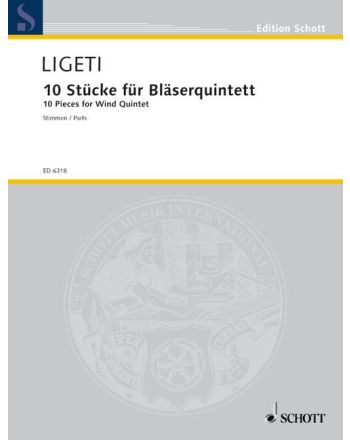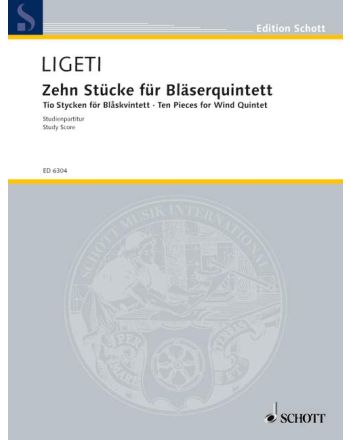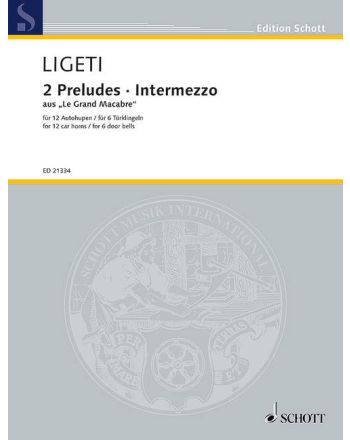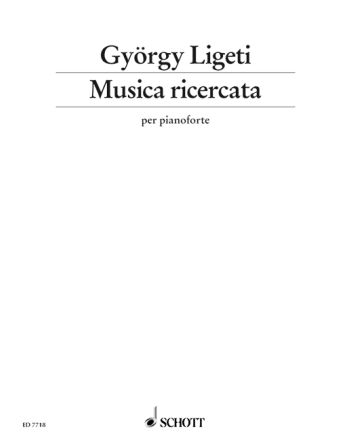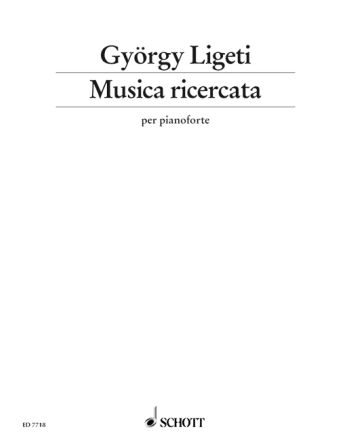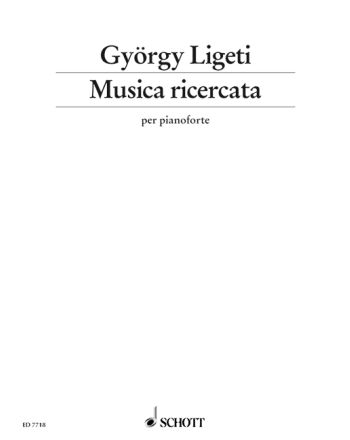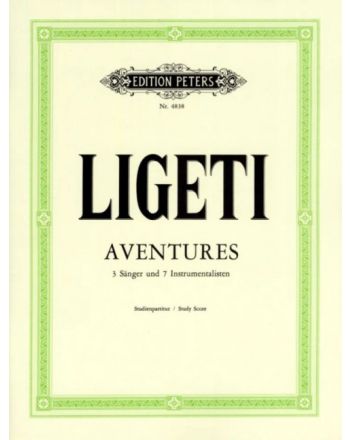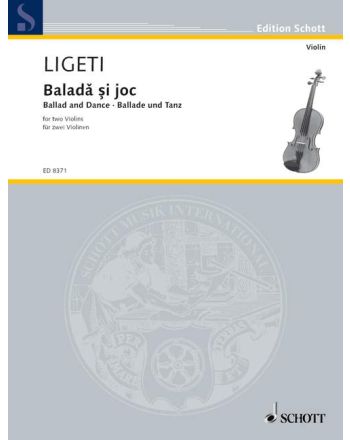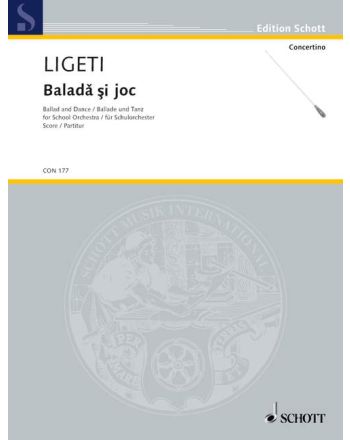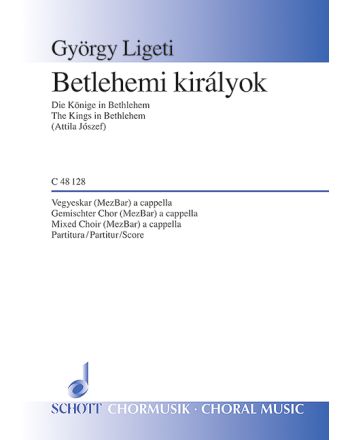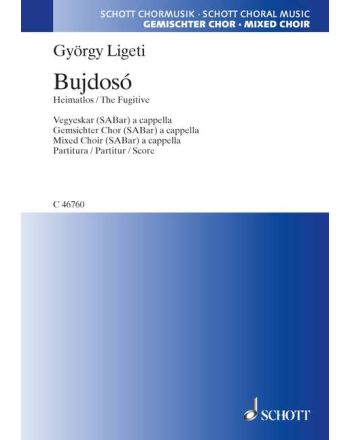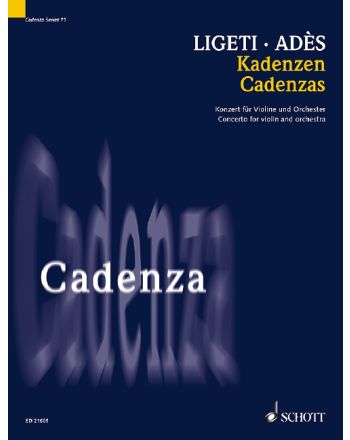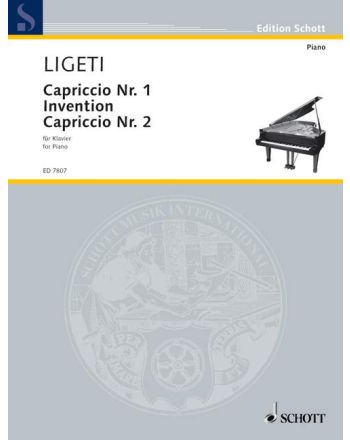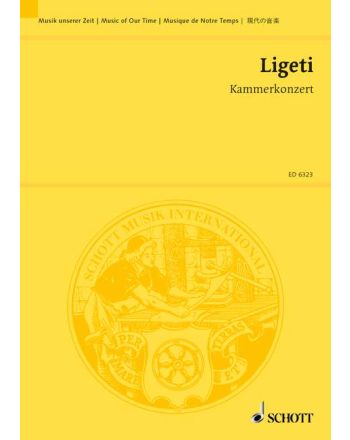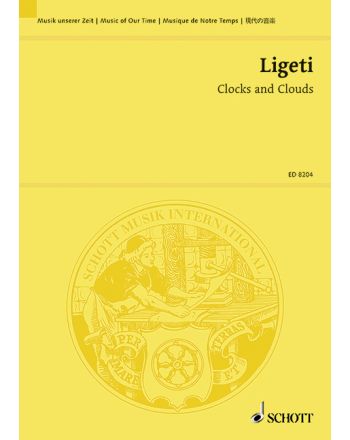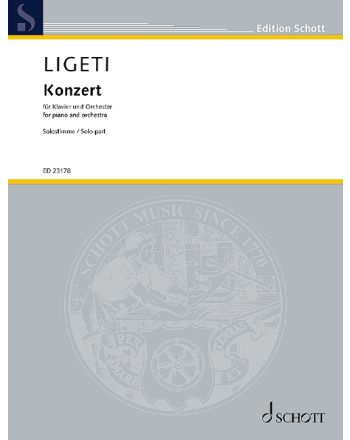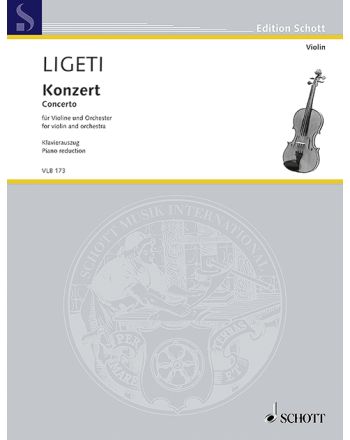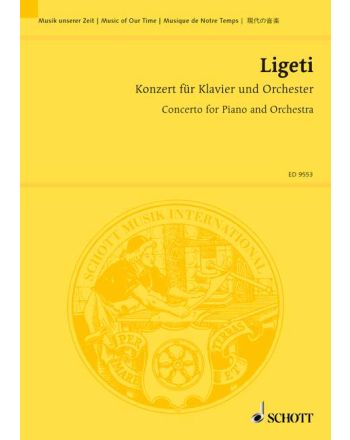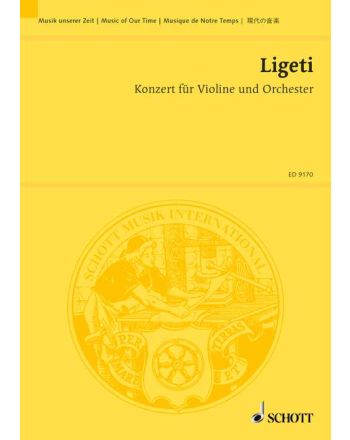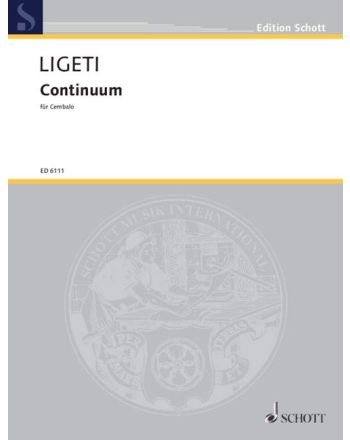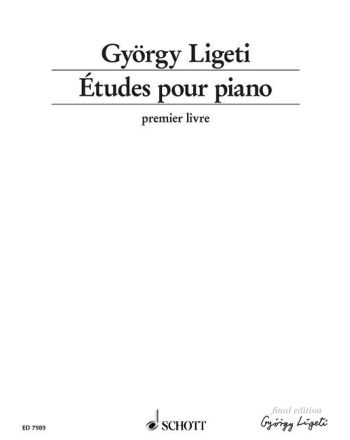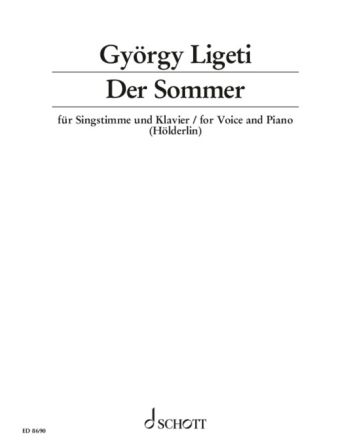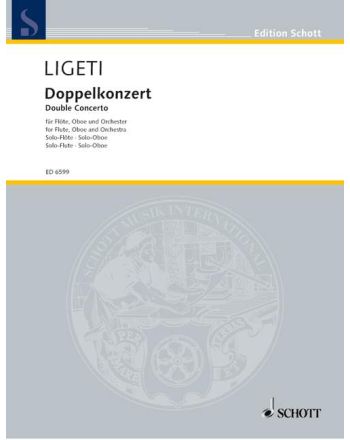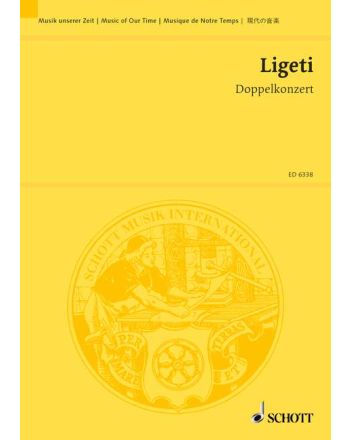
György Ligeti
About György Ligeti
I almost always associate colours, form and consistencies with sounds and vice versa also associate all acoustic sensations with form, colour and material properties. Even abstract terms such as quantity, relationships, coherences and processes appear to me to be sensualised and have their place in an imaginary space. (György Ligeti)
György Ligeti was born on 28.5.1923 as the son of Hungarian-Jewish parents in Dicsőszentmárton (now known as Târnǎveni, in Transylvania/Romania). He studied at the Conservatory in Klausenburg with Ferenc Farkas from 1941 to 1943 and from 1945 to 1949 at the Franz Liszt Academy in Budapest with Sándor Veress, Pál Járdányi and Lajos Bárdos. Following the abatement of the Hungarian Revolution, he left his native country in December 1956 for both political and artistic reasons. During his time as freelancer in the West German Radio studio for electronic music in Cologne (1957-58), he undertook an intense study of the music of Karlheinz Stockhausen, Mauricio Kagel and Pierre Boulez. In the 1960s, Ligeti was associate professor at the Summer School for Contemporary Music in Darmstadt and guest professor at the Royal Swedish Academy of Music in Stockholm. He received a scholarship from the German Academic Exchange Programme (DAAD) in Berlin for 1969-70 and was Composer in Residence at the Stanford University in California in 1972 before being appointed as Professor for Composition at the Hamburg Musikhochschule the following year. The composer made a substantial impact on international contemporary music both as a university professor (up to 1989) and as an active member of the music scene and became the musical aesthetic benchmark for a whole generation. György Ligeti died in Vienna on 12 June 2006.
In specialist musical circles, György Ligeti had already caused a sensation with his electronic composition Artikulation (1958) which had been produced in the Cologne recording studio. He subsequently gained immediate fame throughout the musical world with his orchestral works Apparitions (1958-59) and Atmosphères (1961). Leanings towards extreme micro-polyphony were already visible in the works he had previously composed in Hungary, for example the a capella choral works Éjszaka and Reggel from1955. In the works from the late 1950s and 1960s, the concept of an extremely densely interwoven voice structure was increasingly contrasted with static tonal-spatial compositions. This was achieved with stunning effect: the maximum degree of movement in the voices develops into an audibly perceived spatially “static” music. In the 1980s and 1990s, complex polyrhythmic compositional techniques come to the foreground in Ligeti’s works. This development can be followed clearly in the Etudes pour piano which were published in three volumes and span the compositional period between 1985 and 2001. During the same period, Ligeti was working on the solo concertos for Piano and Orchestra (1985-88) and Violin and Orchestra (1990/92). These compositions – together with the Hamburg Concerto for horn und chamber orchestra (1998/99) – have subsequently been adopted in the solo repertoire of numerous soloists.
Ligeti’s full-length stage work Le Grand Macabre was composed between 1974 and 1977 (revised version 1996) and was based on a fable by Michel de Ghelderode. The persiflage on the Last Judgement in the imaginary country of “Breughelland” develops into an absurd display of the all too human needs of its citizens. Ligeti also utilises the medium of parody in his music which ranges from acrobatic bel canto and complex tone row structures to grotesque sprechgesang.
Alongside membership in the Free Academy of Arts in Hamburg and the Bavarian Academy of Fine Arts in Munich, György Ligeti was honoured as the recipient of numerous prizes: the following list includes only a selection of these awards: Commandeur dans l'Ordre National des Arts et Lettres, Prix de composition musicale de la Fondation Prince Pierre de Monaco (both in 1988), the Music Prize from the Balzan Foundation (1991), the Ernst von Siemens Music Prize (1993), the UNESCO-IMC Music Prize (1996), honorary membership in the Romanian Academy (1997) and nomination as Associé étranger der Académie des Beaux Arts (1998). Ligeti additionally received the Sibelius Prize from the Jenny and Antti Wihuri Foundation (2000), the Kyoto Prize for Art and Science (2001), the Medal for Art and Science from the Senate of the City of Hamburg (2003), the Theodor W. Adorno Prize from the City of Frankfurt (2003) and the Polar Music Prize from the Royal Swedish Academy of Music (2004).
Worklist
Gallery










Chronology
Products
-
Composer: György LigetiEdition: Set of partsSeries: Edition Schott
10 Stücke
Brand: Schott Music
Instrumentation: wind quintetProduct number: ED 6318Product TypeAs low as £23.99 -
Composer: György LigetiEdition: Study scoreSeries: Edition Schott
10 Stücke
Brand: Schott Music
Instrumentation: wind quintetProduct number: ED 6304Product TypeAs low as £16.13 -
for 12 car horns/6 door bells (3 players)Composer: György LigetiEdition: Performing scoreSeries: Edition Schott
Brand: Schott Music
Instrumentation: 12 car horns/6 door bells (3 players)Product number: ED 21334Product TypeAs low as £7.99 -
Composer: György LigetiMedia Type: E-score PDFBrand: Schott Music
Instrumentation: pianoProduct number: ED 8541 Q41161£4.50available for download immediately -
(Béla Bartók in memoriam)Composer: György LigetiMedia Type: E-score PDFBrand: Schott Music
Instrumentation: pianoProduct number: ED 7718 Q41182£3.50available for download immediately -
Composer: György LigetiMedia Type: E-score PDFBrand: Schott Music
Instrumentation: pianoProduct number: ED 7718 Q41176£3.50available for download immediately -
Composer: György LigetiMedia Type: E-score PDFBrand: Schott Music
Instrumentation: pianoProduct number: ED 7718 Q41179£3.50available for download immediately -
Composer: György LigetiMedia Type: Sheet musicEdition: Score and partsBrand: Schott Music
Instrumentation: string quartetProduct number: ED 8334Special Price £14.99 Regular Price £19.99Not in stock, but can be ordered - usually despatched (or ready for collection) within 7 days -
(Omaggio a Girolamo Frescobaldi)Composer: György LigetiMedia Type: E-score PDFBrand: Schott Music
Instrumentation: pianoProduct number: ED 7718 Q41184£3.50available for download immediately -
Composer: György LigetiMedia Type: Sheet musicEdition: Study scoreBrand: Universal Edition
Instrumentation: orchestraProduct number: UE18326Special Price £38.24 Regular Price £50.99In stock - usually despatched (or ready for collection) within 1 working day -
Composer: György LigetiMedia Type: E-score PDFBrand: Schott Music
Instrumentation: pianoProduct number: ED 7989 Q41156£3.50available for download immediately -
Realisiert im Studio für Elektronische Musik des Westdeutschen Rundfunks KölnComposer: György LigetiMedia Type: Sheet music with CDSeries: Artikulation
Brand: Schott Music
Language: German, EnglishProduct number: ED 6378-20Special Price £37.88 Regular Price £50.50Not in stock, but can be ordered - usually despatched (or ready for collection) within 7 days -
Realisiert im Studio für Elektronische Musik des Westdeutschen Rundfunks KölnMedia Type: PosterEdition: Partitur, 4-coloured posterBrand: Schott Music
Language: German, EnglishProduct number: ED 6378-10Special Price £14.99 Regular Price £19.99Not in stock, but can be ordered - usually despatched (or ready for collection) within 7 days -
Composer: György LigetiMedia Type: Sheet musicEdition: Study scoreBrand: Universal Edition
Instrumentation: orchestraProduct number: UE11418Special Price £28.13 Regular Price £37.50In stock - usually despatched (or ready for collection) within 1 working day -
Composer: György LigetiMedia Type: E-score PDFBrand: Schott Music
Instrumentation: pianoProduct number: ED 7989 Q41157£4.50available for download immediately -
Composer: György LigetiMedia Type: Sheet musicEdition: Study scoreBrand: Edition Peters
Instrumentation: three singers (SABar) and 7 instrumentsLanguage: German, EnglishProduct number: EP4838£24.95Not in stock, but can be ordered - usually despatched (or ready for collection) within 7 days -
Musikalisch-dramatische Aktion in 14 BildernComposer: György LigetiMedia Type: BookEdition: LibrettoBrand: Edition Peters
Language: GermanProduct number: EP5935£6.25Not in stock, but can be ordered -
(Ballad and Dance)Composer: György LigetiEdition: Performing scoreSeries: Edition Schott
Brand: Schott Music
Instrumentation: 2 violinsProduct number: ED 8371Product TypeAs low as £8.50 -
(Ballad and Dance)Composer: György LigetiEdition: PartiturSeries: Edition Schott
Concertino
Baladă şi joc
Brand: Schott Music
Instrumentation: school orchestraProduct number: CON 177Product TypeAs low as £12.99 Regular Price £12.99 -
(Ballad and Dance)Composer: György LigetiMedia Type: Sheet musicEdition: Set of string parts (supplementary), 2 Descant Recorders, 2 Violins I, 2 Violins II, 2 Violins III, 2 Cellos, Double BassSeries: Concertino
Baladă şi joc
Brand: Schott Music
Instrumentation: school orchestraProduct number: CON 177-60Special Price £10.49 Regular Price £13.99Not in stock, but can be ordered - usually despatched (or ready for collection) within 7 days -
(Ballad and Dance)Composer: György LigetiMedia Type: Sheet musicEdition: Set of parts, Piano, 2 Descant Recorders, 5 Percussions, 4 Violins I, 4 Violins II, 4 Violins III, 3 Cellos, 2 Double BassesSeries: Concertino
Baladă şi joc
Brand: Schott Music
Instrumentation: school orchestraProduct number: CON 177-50Special Price £27.74 Regular Price £36.99Not in stock, but can be ordered - usually despatched (or ready for collection) within 7 days -
nach rumänischen VolksliedernComposer: György LigetiMedia Type: E-score PDFEdition: descant recorderSeries: Concertino
Brand: Schott Music
Instrumentation: school orchestraProduct number: CON 177-11 Q52977£1.99available for download immediately -
nach rumänischen VolksliedernComposer: György LigetiMedia Type: E-score PDFEdition: Violin ISeries: Concertino
Brand: Schott Music
Instrumentation: school orchestraProduct number: CON 177-14 Q15085£1.99available for download immediately -
nach rumänischen VolksliedernComposer: György LigetiMedia Type: E-score PDFEdition: Violin IISeries: Concertino
Brand: Schott Music
Instrumentation: school orchestraProduct number: CON 177-15 Q15084£1.99available for download immediately -
nach rumänischen VolksliedernComposer: György LigetiMedia Type: E-score PDFEdition: Violin IIISeries: Concertino
Brand: Schott Music
Instrumentation: school orchestraProduct number: CON 177-16 Q15083£1.99available for download immediately -
nach rumänischen VolksliedernComposer: György LigetiMedia Type: E-score PDFEdition: VioloncelloSeries: Concertino
Brand: Schott Music
Instrumentation: school orchestraProduct number: CON 177-17 Q15082£1.99available for download immediately -
nach rumänischen VolksliedernComposer: György LigetiMedia Type: E-score PDFEdition: Double bassSeries: Concertino
Brand: Schott Music
Instrumentation: school orchestraProduct number: CON 177-18 Q15070£1.99available for download immediately -
(The Kings in Bethlehem)Composer: György LigetiEdition: Choral scoreSeries: Schott Choral Music
Brand: Schott Music
Instrumentation: mixed choir (MezBar)Product number: C 48128Product TypeAs low as £3.50 -
"Fölkelt már a csillag" - "Schon aufgegangen die Sterne sind"Composer: György LigetiEdition: Choral scoreSeries: Schott Choral Music
Brand: Schott Music
Instrumentation: mixed choir (SABar)Product number: C 46760Product TypeAs low as £3.50 -
Concerto for violin and orchestraComposer: Thomas AdèsEdition: Separate editionSeries: Cadenza , Vol. 11
Brand: Schott Music
Instrumentation: violinProduct number: ED 21605Product TypeAs low as £5.50 -
Composer: György LigetiMedia Type: E-score PDFBrand: Schott Music
Instrumentation: pianoProduct number: ED 8541 Q41162£3.50available for download immediately -
Composer: György LigetiMedia Type: E-score PDFBrand: Schott Music
Instrumentation: pianoProduct number: ED 7718 Q41180£3.50available for download immediately -
Composer: György LigetiSeries: Edition Schott
Brand: Schott Music
Instrumentation: pianoProduct number: ED 7807Product TypeAs low as £11.24 -
for 13 InstrumentalistsComposer: György LigetiEdition: Study scoreSeries: Music Of Our Time
Kammerkonzert
Brand: Schott Music
Instrumentation: 13 instrumentalistsProduct number: ED 6323Product TypeAs low as £23.99 -
for 12-part female choir and orchestraComposer: György LigetiEdition: Study scoreSeries: Music Of Our Time
Clocks and Clouds
Brand: Schott Music
Instrumentation: Women's Choir (in 12 voices) and OrchestraProduct number: ED 8204Product TypeAs low as £18.99 -
Author: György LigetiEditor: Monika LichtenfeldMedia Type: BookEdition: 2 volumesSeries: Publications from the Paul Sacher Foundation , Vol. 10
Brand: Paul Sacher Stiftung
Language: GermanProduct number: PSB 1014£42.99Not in stock, but can be ordered - usually despatched (or ready for collection) within 7 days -
Composer: György LigetiMedia Type: E-score PDFBrand: Schott Music
Instrumentation: player pianoProduct number: ED 8654 Q41172£4.50available for download immediately -
Composer: György LigetiMedia Type: E-score PDFBrand: Schott Music
Instrumentation: pianoProduct number: ED 8654 Q41171£4.50available for download immediately -
for piano and orchestraComposer: György LigetiEdition: Solo partSeries: Konzert
Brand: Schott Music
Instrumentation: Piano and orchestraProduct number: ED 23178Product TypeAs low as £18.99 Regular Price £18.99 -
for violin and orchestraComposer: György LigetiEdition: Piano reduction with solo partSeries: Edition Schott
Violin Library
Konzert
Brand: Schott Music
Instrumentation: violin and orchestraProduct number: VLB 173Product TypeAs low as £45.50 -
for Piano and OrchestraComposer: György LigetiEdition: Study scoreSeries: Music Of Our Time
Konzert
Brand: Schott Music
Instrumentation: Piano and OrchestraProduct number: ED 9553Product TypeAs low as £36.99 -
for Violin and OrchestraComposer: György LigetiEdition: Study scoreSeries: Music Of Our Time
Konzert
Brand: Schott Music
Instrumentation: violin and orchestraProduct number: ED 9170Product TypeAs low as £27.74 -
for Piano and OrchestraComposer: György LigetiMedia Type: Sheet musicSeries: Konzert
Brand: Schott Music
Instrumentation: piano and orchestraProduct number: ED 7746Special Price £47.99 Regular Price £63.99Not in stock, but can be ordered - usually despatched (or ready for collection) within 7 days -
Composer: György LigetiSeries: Edition Schott
Brand: Schott Music
Instrumentation: harpsichordProduct number: ED 6111Product TypeAs low as £11.99 -
Composer: György LigetiMedia Type: E-score PDFBrand: Schott Music
Instrumentation: pianoProduct number: ED 7989 Q41153£4.50available for download immediately -
based on Friedrich HölderlinComposer: György LigetiBrand: Schott Music
Instrumentation: voice and pianoProduct number: ED 8690Product TypeAs low as £9.50 -
Composer: György LigetiMedia Type: E-score PDFBrand: Schott Music
Instrumentation: pianoProduct number: ED 8654 Q41167£4.50available for download immediately -
Composer: György LigetiMedia Type: E-score PDFBrand: Schott Music
Instrumentation: pianoProduct number: ED 7989 Q41152£4.50available for download immediately -
Composer: György LigetiEdition: Set of solo parts, flute / oboe solo partSeries: Edition Schott
Doppelkonzert
Brand: Schott Music
Instrumentation: flute, oboe and orchestraProduct number: ED 6599Product TypeAs low as £16.13 -
Composer: György LigetiEdition: Study scoreSeries: Music Of Our Time
Doppelkonzert
Brand: Schott Music
Instrumentation: flute, oboe and orchestraProduct number: ED 6338Product TypeAs low as £25.50

